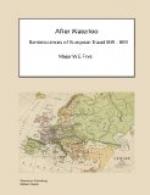America, serpents from Java, and crocodiles from the
Nile. Here, so Kotzebue has calculated, you may
go through all the functions of life in one day and
end it afterwards should you be so inclined. You
may eat, drink, sleep, bathe, go to the
Cabinet
d’aisance, walk, read, make love, game and,
should you be tired of life, you may buy powder and
ball or opium to hasten your journey across Styx;
or should you desire a more classic
exit, you
may die like Seneca opening your veins in a bath.
Deep play goes forward day and night, and I verily
believe there are some persons in Paris who never
quit these precincts. The restaurants and cafes
are most brilliantly fitted up. One,
Le Cafe
des Mille Colonnes, so called from the reflection
of the columns in the mirrors with which the wainscoat
is lined, boasts of a
limonadiere of great
beauty. She is certainly a fine woman, dresses
very well, as indeed most French women do, and has
a remarkably fine turned arm which she takes care
to display on all occasions. I do not, however,
perceive much animation in her; she always appears
the same, nor has she made any more impression on me—tho’
I am of a very susceptible nature in this particular—than
a fine statue or picture would do. There she
sits on a throne and receives the hommage and compliments
of most of the visitors and the money of all, which
seems to please her most, for she receives the compliments
which are paid her with the utmost
sang-froid
and indifference, and the money she takes especial
care to count. English troops, conjointly with
the National Guard, do duty at the entrance of the
Palais Royal from the Rue St Honore; and it became
necessary to have a strong guard to keep the peace,
as frequent disputes take place between the young
men of the Capital and the Prussian officers, against
whom the French are singularly inveterate.
The French, when left to themselves, are very peaceable
in their pleasures and the utmost public decorum is
observed; their sobriety contributes much to this;
but if there were in London an establishment similar
to that of the Palais Royal, it would become a perfect
pandemonium and would require an army to keep the
peace. The French police keep a very sharp look-out
on all political offences, but are more indulgent
towards all moral ones, as long as public decorum
is not infringed, and then it is severely punished.
But they have none of that censoriousness or prying
spirit in France which is so common in England to
hunt out and criticise the private vices of their
neighbours, which, in my opinion, does not proceed
from any real regard for virtue, but from a fanatical,
jealous, envious, and malignant spirit. Those
vice-hunters never have the courage to attack a man
of wealth and power; but a poor artisan or labourer,
who buys a piece of meat after twelve o’clock
on Saturday night, or a glass of spirits during church-time
on Sunday, is termed a Sabbath-breaker and imprisoned
without mercy.




